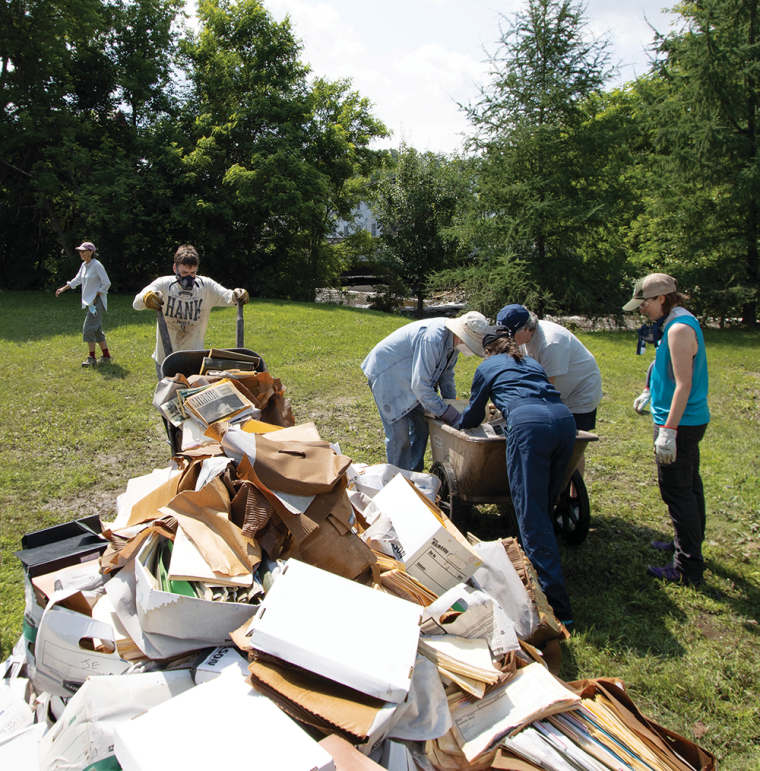A major downpour in July inundated great swaths of Vermont with up to nine inches of water, washing out neighborhoods across the state just twelve years after Hurricane Irene wreaked similar destruction. Scientists say climate change is increasing the frequency of extreme weather events like these. As Vermont’s literary organizations and businesses attempt to regroup, they are doing what many others may increasingly be called to do in a more treacherous future: leaning on community support, including from other arts institutions that have survived similar disasters.

Volunteers gather to clean up flood damage to Vermont Studio Center. (Credit: Matt Neckers)
In Johnson, thirty miles north of Montpelier, flooding severely damaged two buildings at Vermont Studio Center (VSC), which hosts residencies for writers and artists. The residents’ lounge took on four feet of water, and first-floor studios in another building were destroyed. One staff member lost art representing years of work. The art-book collection, digital print lab, and print collection were also damaged.
After the flood came an outpouring of support. VSC received hundreds of donations as well as help from architects, engineers, and other experts. Dozens of locals and visiting residents volunteered to clean up, wearing protective gear because the floodwaters contained untreated sewage. It took several anxious days to find a disaster mitigation firm with workers to spare. Finally a crew from Chicago flew in to strip out the sodden drywall and floorboards and bleach what remained. The VSC team is working to figure out how to accommodate residents without access to the flood-compromised rooms. The hardest-hit spaces will not be rebuilt, says Hope Sullivan, VSC’s executive director.
“It was a really strange time but oddly a bonding moment,” she says about the days after the flooding. “We were all in it together.”
Offers of help came from other organizations as well. In Montpelier, the Vermont College of Fine Arts, which was not damaged, has offered storage space and temporary offices for affected organizations while they rebuild.
Appalshop, an arts nonprofit in Whitesburg, Kentucky, reached out to VSC and other Vermont arts organizations to share hard-won knowledge. Appalshop faced a similar catastrophe in 2022; it was critically damaged when the North Fork of the Kentucky River swelled more than twenty feet and filled its two main buildings with six and a half feet of water. Landslides pummeled houses of staff and community members, leaving many homeless.
The nonprofit, which teaches filmmaking, radio, theater, and photography, applied for grants to restore its programming and hired firms to repair its damaged hard drives and footage. FEMA purchases properties at risk of repeated flooding, and Appalshop requested such buyouts; the byzantine process took a year for one building and longer for the other. At press time the nonprofit had not decided whether to move.
“We’re still not back to a sense of normalcy,” says Kathleen Byrne, Appalshop’s institutional development director. “Recovery lasts long after the media coverage ends.”
Bear Pond Books in Montpelier is similarly relying on community support. The store had been gearing up for a fiftieth-anniversary celebration in August when the flood shuttered it for weeks. “Everything below four feet of water was damaged. The basement flooded, and it came up through the floors,” says Claire Benedict, Bear Pond’s co-owner.
With Bear Pond closed, supporters—from Vermont and beyond—ordered books and made donations through the store’s website. The store owners did a complete renovation, replacing wood floors with waterproof laminate material.
“I don’t think we can count on this being a once-in-a-lifetime thing, with climate change,” Benedict says. Nonetheless, she does not plan to throw in the towel. “We’re determined to rebuild. I don’t even know if that’s a good idea, but it’s unthinkable that Bear Pond Books would not be in downtown Montpelier,” she says. The store reopened to the public in September.
Cynthia Sherman, executive director of the Association of Writers and Writing Programs (AWP), says lessons learned during the COVID-19 pandemic can help organizations prepare for climate-related disasters. Sherman recommends that conference organizers secure cancellation insurance, which helped AWP recoup losses when numerous attendees backed out of its March 2020 conference in San Antonio, Texas, days before the president declared a national emergency due to the pandemic. Conference planners should also inspect the force-majeure clause in any contracts of their own to ensure they offer financial protection in the event of a natural disaster, she says.
When choosing future AWP conference locations, Sherman considers the chances of heat waves, hurricanes, earthquakes, and blizzards—and she advises that other literary event planners do the same. But caution cannot always avert disaster. “No matter where you hold your meeting, if there isn’t a climate event there, there could be one somewhere else where your attendees are coming from,” she says.
Writers, as storytellers, have an important role to play in addressing climate change, says Lacy M. Johnson, a professor of creative writing at Rice University in Houston. In the wake of Hurricane Harvey, which deluged parts of the sprawling Texas city in 2017, Johnson founded the Houston Flood Museum, an internet archive that gathers narratives about the aftermath and legacy of the storm. She also coedited More City Than Water: A Houston Flood Atlas (University of Texas Press, 2022), a project of the museum that collects narratives and maps exploring Houston flooding from diverse perspectives.
“There is a collective amnesia here and maybe some denialism about our relationship to flooding,” says Johnson, whose neighborhood was damaged by Harvey. While in a coffee shop in an unaffected part of Houston, she realized that people “were not talking about this enormous, massive, catastrophic disaster that was affecting their neighbors. For them the disaster had moved on.” Not long after the hurricane, Johnson says, the city council voted unanimously to approve a developer’s plan to build in the floodplain.
All of this spurred Johnson’s realization that the mitigation of future climate disasters depends on sustained, collective attention to these knotty problems. This was why she founded the Houston Flood Museum: to keep scientists, lawmakers, and community members engaged.
“I initially thought of these disasters as a distraction, as in, ‘I’m going to recover from the disaster and go back to where I was,’” she says. “But there is no going back, and my work is not somewhere else. This is the work.”
Jonathan Vatner is the author of The Bridesmaids Union (St. Martin’s Press, 2022) and Carnegie Hill (Thomas Dunne Books, 2019). The managing editor of Hue, the magazine of the Fashion Institute of Technology, he teaches at New York University and the Hudson Valley Writers Center.








